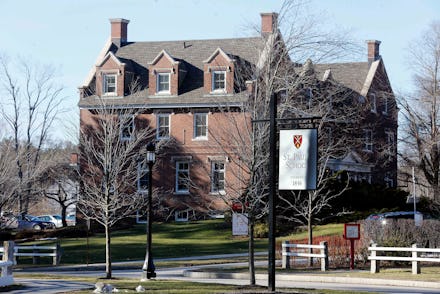The Owen Labrie St. Paul's trial fallout just keeps getting worse

It would seem that St. Paul's School — the elite prep school in Concord, New Hampshire, at the center of the Owen Labrie alleged rape case — is being less than forthcoming with its alumni regarding its treatment of the victim in said case.
On Aug. 11, St. Paul's filed a motion requesting that the victim and her family not be allowed to use pseudonyms at trial. The victim's parents are suing the school for having created an environment in which statutory rape is baked into tradition — Labrie was accused of sexually assaulting a 15-year-old girl as part of the "senior salute," wherein seniors try to hook up with as many freshman as possible.
The victim wishes to go by J.D., and her parents want to go by John and Jane Doe. In its plea, St. Paul's suggested the anonymity should be two-sided, because reporting on the story is tarnishing its image.
"Judicial proceedings are supposed to be open and transparent," the plea reads, also alleging that the plaintiffs have launched a media attack on St. Paul's "from behind a cloak of anonymity."
Media coverage of the school's motion has not been favorable, given that revealing a victim's identity could prevent future sexual assault victims from coming forward. On Aug. 15 — four days after the motion was filed — the president of the school's board of trustees sent a letter to alumni addressing the "number of inquiries" he said the school was receiving.
In the letter, obtained by Jezebel, Archibald Cox Jr. explained that no, the school does not have "any desire or intention to reveal the identity of the young woman or her family" — but that the victim's continued anonymity is contingent on the family stopping its "coordinated media attacks" against the school:
We did not oppose the family's use of pseudonyms, and certainly did not request that the young woman's name be made public. Rather, we agreed to the family's use of pseudonyms during pretrial phases of litigation, provided they agreed to stop improperly attacking the School's character in statements to the press. The point of the pleading was to suggest that the family's request to proceed anonymously should incorporate the School's desire for the matter to be handled responsibly in court and not through coordinated media attacks.
In the plea, the school asked that the plaintiffs refrain from talking to the media; that the victim be identified "during the discovery and fact investigation process" as well as during depositions; and that the plaintiffs not be allowed to use pseudonyms at trial.
It's that last point that's particularly contentious, according to CBS News legal analyst Rikki Klieman.
On CBS This Morning, Klieman explained that St. Paul's is essentially asking for a gag order. Where the school fumbled its plea, she said, was in making it quid pro quo — we'll let you remain anonymous, if you stay away from reporters.
The victim was a minor when the assault occurred, but won't be when the civil suit goes to trial — and that could mean her name gets used in court anyway. There have been cases, Klieman said, in which pseudonyms for adults get dropped. If that happens in the St. Paul's civil suit, it could set a dangerous example for future trials related to sexual assault.
"The reason it could be precedent setting here — and cause a terrible, chilling effect on women who would like to come forward who are underage, or who have simply been sexual assault victims — is that this case is so infamous," Klieman said.
St. Paul's declined to provide a comment to Mic.